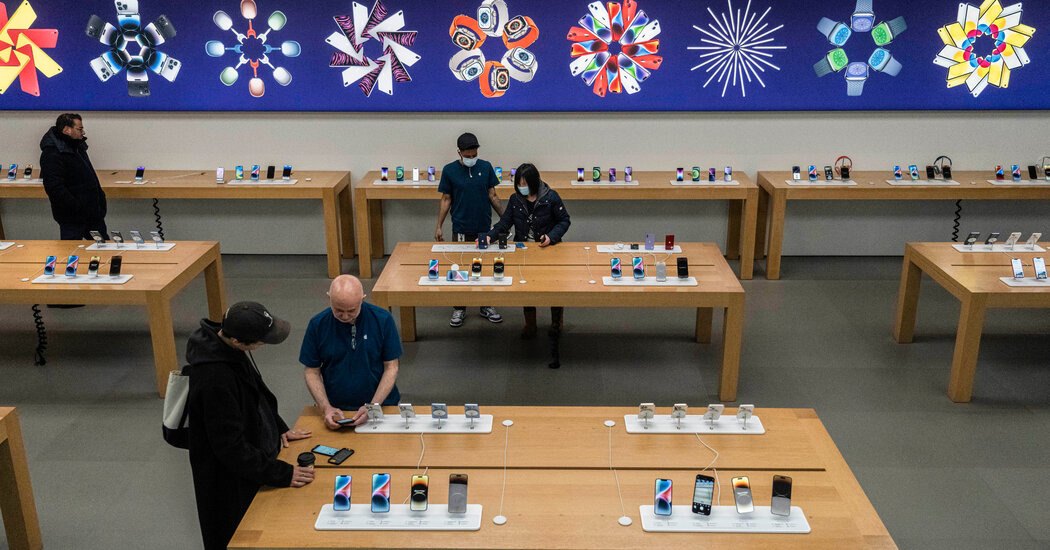Apple will conduct a review of its U.S. employment practices under an agreement with a coalition of investors, including five New York City-based pension funds.
The review will focus on whether Apple is complying with its official human rights policies regarding “workers’ freedom of association and collective bargaining rights in the United States,” the company said in a filing with the Securities and Exchange Commission last week.
The audit comes amid complaints from federal regulators and workers that the company has repeatedly violated workers’ labor rights over the past year as they attempted to unify. Apple has denied the allegations.
“There is a large apparent disconnect between Apple’s stated human rights policy regarding labor organization and its practices,” said Brad Lander, the New York City comptroller, who helped spark the discussion with Apple on behalf of the city’s public pension funds.
As part of the agreement with the coalition of investors, which includes other pension funds for unionized workers, Apple agreed to hire an outside firm to conduct the assessment, the coalition said in a letter to the company’s chairman on Tuesday.
Labor organization and trade union actions
The letter also included recommendations for the assessment, including hiring a company that has expertise in labor rights and that companies do not provide advice on how to avoid unionization. It recommended that the company “be as independent as possible”.
Apple’s federal filing made no explicit reference to a third party, and the company declined to comment further.
Members of the investor coalition held about $7 billion in Apple stock last week, on a market cap of more than $2 trillion. In the financial statement announcing the review, Apple gave few details, saying it would conduct the review by the end of the year and would publish a report related to the review.
Last year, workers voted to unionize at two Apple stores — in Townson, Md., and Oklahoma City — and workers at two other stores filed petitions to hold union elections before withdrawing them.
Many employees involved in unionizing at the company said they enjoyed their jobs and praised their employer, citing benefits such as healthcare and stock exchanges and the satisfaction of working with Apple products. But they said they hoped unionization would help them get better pay, more input into the schedule, and more transparency when it comes to getting work orders and promotions.
In May, Apple announced it would increase its hourly minimum wage from $20 to $22, a move some employees interpreted as an attempt to undercut their organizational campaigns.
Employees have also filed charges accusing Apple of labor law violations in at least six stores, including allegations that the company illegally monitored them, banned union fliers from a break room, questioned them about their organization, threatened them for organizing and that it stated that union organizations would be pointless.
The Communications Workers of America, the union representing Apple employees in Oklahoma City, has also filed suit accusing Apple of setting up an illegal corporate union at a store in Columbus, Ohio. an independent union.
The National Labor Relations Board has filed formal complaints in two of the cases, involving stores in Atlanta and New York.
Apple has said that “we strongly disagree” with the claims made before the Labor Commission and that it looks forward to defending itself. The company has emphasized that “regular, open, honest and direct communication with our team members is an important part of Apple’s collaborative culture.”
The investor coalition that pushed for the labor review argues that Apple’s response to the union campaigns violates its human rights policy, as those policies require it to respect the International Labor Organization’s Declaration on Fundamental Principles and Rights at Work, which “promotes freedom of association and the effective recognition of the right to collective bargaining.”
New York’s comptroller, Mr. Lander, said the coalition initially contacted Apple’s board of directors last spring to discuss the company’s stance on unionization, but received no substantive response.
The coalition then submitted a shareholder proposal in September urging Apple to hire an outside firm to assess whether the company was living up to its promised commitment to labor rights. The company responded late last year and the two sides came to an agreement in return for the coalition withdrawing the proposal, Mr Lander said.
A coalition of some of the same investors, including the New York pension funds, has introduced a similar proposal to Starbucks, where employees have voted for union membership in more than 250 company-owned stores since the end of 2021. Like Apple, Starbucks has cited its commitment to International Labor Organization standards, such as freedom of association and the right to participate in collective bargaining.
But Starbucks has consistently resisted efforts by its employees to unite, and Starbucks has not engaged with the coalition of investors to reach an agreement. Jonas Kron, chief advocacy officer of Trillium Asset Management, one of the investors submitting proposals to both companies, said he expected the Starbucks proposal to be voted on by the company’s shareholders. The company declined to comment.
The Federal Labor Board has filed several dozen formal complaints against Starbucks for violations, including retaliation against workers involved in organizing and discriminating against union members in introducing new benefits; the company has denied violating labor laws.

